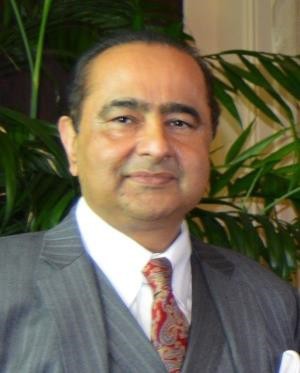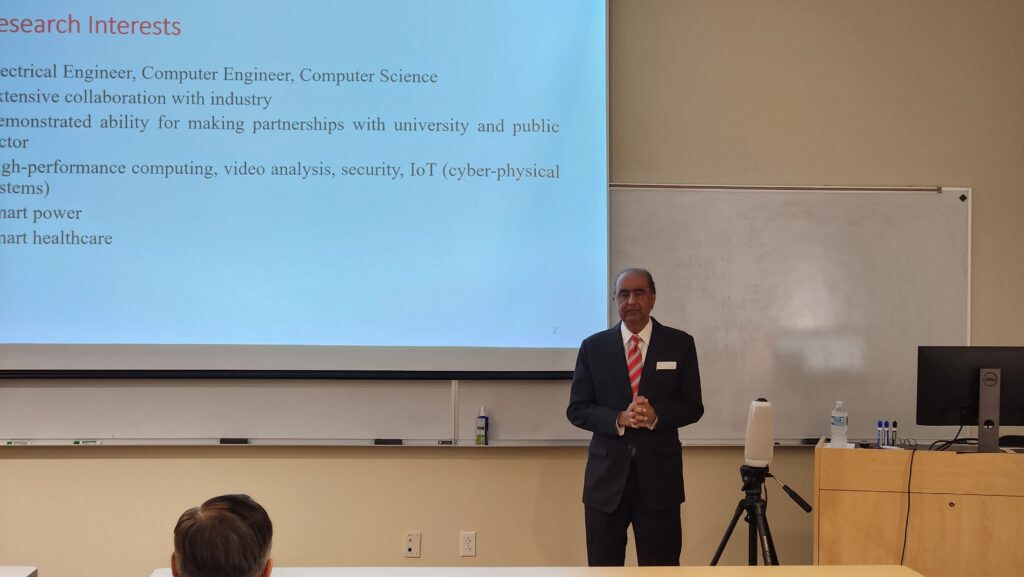Joint Technical Seminar of Tallahassee IEEE PES Chapter, FAMU-FSU College of Engineering, and the Center for Advanced Power Systems
Title: AI-Enabled Technologies for People with Disabilities: Some Key Research and Privacy/Security Challenges
Presenter: Dr. Ishfaq Ahmad, Professor of Computer Science, The University of Texas at Arlington
Time: 2:00 pm – 3:00 pm, Monday, April 15, 2024
Location: Room 114, Materials Research Building, 2005 Levy Avenue, Tallahassee, Fl 32310
Abstract
The World Health Organization (WHO) defines disability as the interaction between individuals with a health condition (physical or mental) and personal and environmental factors. Often, People with Disabilities (PWD) have to endure physical, attitudinal, communication, and financial barriers—in fact, the most significant barrier for PWD is how society disables them. They also experience multiple violations of their rights, including acts of violence, abuse, prejudice, stigmatization, discrimination, and disrespect because of their disability, which intersects with other forms of discrimination based on age and gender, among other factors. Disability is a critical human rights issue and is at the core of society’s grand challenges, and we will personally experience it if we live long enough. The term assistive technology spans the systems and services related to delivering assistive products and services. Examples include communication tools, assistive robots, mobility enhancement, boosted educational and learning apps, smart visual and hearing aids, smart hospitals, and intelligent care environments. AI-enabled assistive technologies can alleviate reintegration and service-connected health challenges—perceptual disorders, pain disorders, musculoskeletal injuries limiting mobility, post-traumatic stress disorder (PTSD), depression, traumatic brain injury, and substance use disorders. As the wave of AI sweeps across the globe and penetrates virtually every sphere of life, we can harness it to develop highly advanced assistive technologies. Empowering PWD to improve their lives is the best gift an engineer or scientist can give to people. With the burgeoning global population and an upsurge in non-communicable diseases, more than two billion people will need at least one assistive product by 2030. A case in point is multiple assistive robots. Their coordination and orchestration include several key research tasks that require creative techniques. The goal is to provide assistance to the health care providers by automating some of the chores. We also describe some of our research projects on assistive technologies, highlight their key aspect, and identify some critical security and privacy issues.
Biography
Ishfaq Ahmad (IEEE Fellow) is a computer science and engineering professor and director of the Center for Advanced Computing Systems at the University of Texas at Arlington (UTA), which he joined in 2002. He earned his Ph.D. in Computer Science and M.S. in Computer Engineering from Syracuse University, New York, U.S.A. He has authored nearly 300 publications, including books and peer-reviewed research papers on high-performance computing, optimization algorithms, digital video compression, AI-enabled assistive technologies, and sustainable computing. His current focus is solving large-scale AI problems on massively parallel supercomputer systems. Dr. Ahmad has received numerous international research awards and about $15 million in research funding. Google Scholar shows his research papers as highly cited in several computer science and engineering sub-branches. He has chaired over 20 international conferences and delivered more than 150 talks, including several keynote speeches. While being a professor, he has held additional positions: a senior visiting scientist at the Chinese Academy of Sciences in Beijing; a visiting lecturer at NASA’s Johnson Space Center, Houston, Texas; a frequent senior visiting scientist at the U.S. Air Force Research Laboratory in Rome, New York, a certified ABET evaluator, and an honorary professor at several universities worldwide. Additionally, he is the founding Editor-in-Chief of Sustainable Computing: Informatics and Systems and the founding and current Editor-in-Chief of Springer’s Discover Internet-of- Things. He has also served as editor of IEEE Transactions on Parallel and Distributed Systems, IEEE Distributed Systems Online, Journal of Parallel and Distributed Computing, IEEE Transactions on Circuits and Systems for Video Technology, and IEEE Transactions on Multimedia. Outside his main domain, he has recently authored a comprehensive biography of the Prophet of Islam, entitled, “The Perfect Human, Muhammad (Peace Be Upon Him), How the Last Prophet of God Changed the World.”


